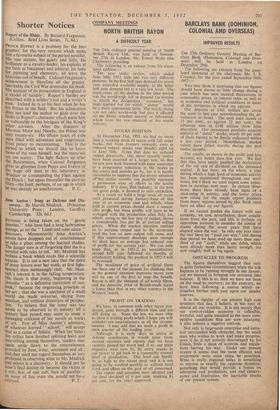REVENGE is being taken on the " gentle aneites," who
have had a long lachrymose innings, as on the" Lamb and mint sauce" devotees. Momentarily Jane Austen 's novels have dropped out of entertainment to take a place among the learned studies. The danger now is of forgetting that she is a novelist with tales to tell. Mr. Mudrick has written a book which reads like a scientific treatise. It is not a new idea that the spirit of irony hovers over her work, at first light- hearted, then increasingly 1 chill. Mr. Mud-
's interest is in the falling temperature. His thesis is that irony, beginning in the JUvenilia " as a defensive restriction of out- look," became the organisipg principle of her art ; that she was a spectator of a small world she made universal, shying from emotion, and without distortion of perspec- tive. To believe that the irony was too subtle to be observed in its entirety till a century had passed may seem to some a damaging criticism of her novels as works of art. Few of Miss Austen's admirers, of whatever learned •" school," will accept that as a cause of failure. When her latter- day critics have finished splitting hairs and quarrelling among themselves, readers may again settle down to the entertainment Provided by Jane, irony, sentiment and all ; and they need not regard themselves as very profound in observing what to Mr. Mudrick and others is a discovery. It should not be Jane's final destiny to become the victim of a cult, first of one cult, then of another-- an irony of fate even she Avould not 'have


















































 Previous page
Previous page